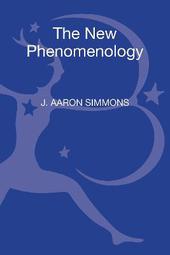
|
The New Phenomenology: A Philosophical Introduction
Hardback
Main Details
| Title |
The New Phenomenology: A Philosophical Introduction
|
| Authors and Contributors |
By (author) Professor J. Aaron Simmons
|
|
By (author) Dr Bruce Ellis Benson
|
| Physical Properties |
| Format:Hardback | | Pages:296 | | Dimensions(mm): Height 216,Width 138 |
|
| Category/Genre | Phenomenology and Existentialism |
|---|
| ISBN/Barcode |
9781441117113
|
| Classifications | Dewey:142.7 |
|---|
| Audience | | Undergraduate | | Postgraduate, Research & Scholarly | |
|---|
|
Publishing Details |
| Publisher |
Bloomsbury Publishing Plc
|
| Imprint |
Bloomsbury Academic USA
|
| Publication Date |
1 August 2013 |
| Publication Country |
United States
|
Description
The New Phenomenology: A Philosophical Introduction is the first available introduction to the group of philosophers sometimes associated with the so-called 'theological turn' in contemporary French thought. This book argues that there has not been a 'turn' to theology in recent French phenomenology, but instead a decidedly philosophical reconsideration of phenomenology itself. Engaging the foundational works of Emmanuel Levinas and Michel Henry, as well as later works by Jacques Derrida, Jean-Luc Marion and Jean-Louis Chretien, the book explores how these thinkers offer a coherent philosophical trajectory - the 'New Phenomenology.' Contending that New Phenomenology is of relevance to a wide range of issues in contemporary philosophy, the book considers the contributions of the new phenomenologists to debates in the philosophy of religion, hermeneutics, ethics, and politics. With a final chapter looking at future directions for research on possible intersections between new phenomenology and analytic philosophy, this is an essential read for anyone seeking an overview of this important strand of contemporary European thought.
Author Biography
J. Aaron Simmons is Assistant Professor of Philosophy at Furman University, USA. He is the author of God and the Other: Ethics and Politics After the 'Theological Turn' (2011), and the co-editor of Reexamining Deconstruction and Determinate Religion (2012), and Kierkegaard and Levinas: Ethics, Politics and Religion (2008). Bruce Ellis Benson is Professor of Philosophy at Wheaton College, USA. Among his many publications are The Improvisation of Musical Dialogue (2003) and Pious Nietzsche: Decadence and Dionysian Faith (2008).
ReviewsThis book makes a constructive contribution to an important and growing philosophical discussion ... [It] offers not only an introduction to the philosophers considered, but also a fresh perspective from which to read them. * Sophia * A rich resource both as a lucid introduction and as a bold interpretation of the thought of Derrida, Levinas, Henry, Marion, and Chretien as phenomenological "heretics" against the background of Husserl and Heidegger. Careful attention is given to their significance for both the philosophy of religion and the very idea of phenomenology itself. Specific suggestions are made for cross-fertilization between these "continental" thinkers and the "analytic" philosophy of religion, along with proposals for the significance of an essentially descriptive enterprise for normative questions of ethics, politics, and society. -- Merold Westphal, Distinguished Professor of Philosophy Emeritus, Fordham University Simmons and Benson offer us one of the first attempts to survey efforts in France since the early 1960s to break down the alleged barrier between phenomenology and theology. Of particular interest is a rare and welcome move, late in the book, to connect contemporary French philosophy of religion with work being done in the Anglo-American world. -- Jeffrey Bloechl, Associate Professor of Philosophy, Boston College Benson and Simmons' The New Phenomenology is a timely addition to current debates in philosophy as well as theology. The book aptly shows the origins and future possibilities of the thought of these new phenomenologists in an overview which spans some of the most compelling thinkers today. Benson and Simmons succeed in making this material highly accessible: all students of phenomenology will greatly benefit from this work. -- Dr. Joeri Schrijvers, Faculty of Philosophy, KU Leuven, Belgium
|